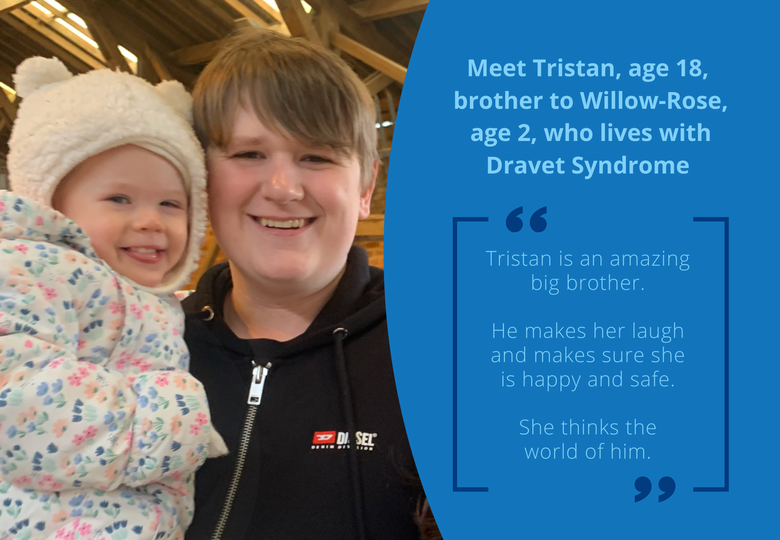Supporting Siblings
Siblings of those diagnosed with Dravet Syndrome have to experience many things that you would never wish your child to see: prolonged seizures, ambulance trips, hospital intervention and challenging behaviour, to name just a few.
They also need to adapt to the day-to-day pressures of living with Dravet Syndrome: the fact that there are times when plans are cancelled, holidays are not possible, sleepovers just too intense and the simple fact that their mum and dad are stressed, worried and exhausted. They may also experience those feelings of isolation or guilt that often go alongside the pressures of living with a disabled sibling.
Despite all these difficulties, many families report how caring and loving siblings can be to their brothers and sisters. Having a sibling with special needs undoubtedly brings challenges, but there’s a positive side too. Living with a brother or sister with Dravet Syndrome helps to teach empathy, kindness and compassion. With the right knowledge and support, siblings cope and adapt, and often develop extraordinarily close bonds with the brothers and sisters.
Supporting super siblings
It is important to be aware of the potential impact that living with a brother or sister with Dravet Syndrome may have for siblings. Talk honestly to them, at a level appropriate for their age. Research shows that siblings cope best when they are told about what is happening and when they can share their feelings about it. Of course, it’s not always easy to start these conversations and you may find it easier to discuss issues with children by doing activities together. With younger children you could try making a scrapbook about your family that includes information about family life with Dravet Syndrome. You could read story books together about children who are disabled or have additional needs and their siblings.
A letter to give to teachers
Sometimes the ups and downs of living with a brother or sister who has Dravet Syndrome can impact school life. One of our families shared a letter for teachers setting out the different ways in which a sibling's daily life could be disrupted by Dravet, both at school and home. We thought it was a brilliant idea, and with much thanks to its original author, we're happy to share a template version of the letter here.
Sibling Story - Aaliyah, Sister to Saniyah
Meet Aaliyah, older sister to Saniyah who lives with Dravet Syndrome. There may be a 16-year age gap, but it's been no barrier to them forming the most beautiful of sibling bonds. In her own words, Aaliyah tells us more.
Sibling Story - Ella, sister to Sebastian
Penny, mum to Sebastian, who is living with Dravet Syndrome, shares her thoughts on how Seb's sister, Ella, copes with the daily challenges they face.
Sibling Story - Ellie, sister to Amy
In her own words, Ellie talks about her experiences as a sibling and her very special relationship with her sister, Amy.
Sibling Story - Ella, sister to Jake
Ella won a 'Love Barrow Award' in 2022 for the support she provides to her twin brother, Jake, who is living with Dravet Syndrome. Mum, Stephanie, explains why.
Siblings' organisations
If you think your super sibling might be struggling, there are specialist sibling support groups that you may find helpful, such as the organisation Sibs, which provides useful information and support for children and adult siblings who have a brother or sister who is disabled, and for parents too.
These organisations provide services that can be hugely beneficial in helping siblings to understand their feelings, share fears or worries and know that they are not alone.
In addition, many local authorities run sibling groups, where they can get together with other children in a similar situation. Many hospices also run sibling activities or have play therapists who are able to help siblings organise their thoughts and feelings. If you feel this is something that would be beneficial, speak to your social worker or GP who will be able to refer you to young carers’ organisations.
East Midlands Ambulance Service - My EMAzing Activity Pack
Designed for children aged 5-10 years, East Midlands Ambulance Service's Children's Activity Pack contains 12 pages of activities and educational messages, such as: how and when to call 999, what to expect when you call 999, different people who work in the ambulance service and what they do. The pack also includes a cut-out model ambulance and colouring in. We think this resource is EMAzing for siblings to those who live with Dravet Syndrome, helping them to feel more confident and relaxed when an ambulance and paramedics arrive at their home. You can download the pack here.
Nominate a sibling in our Annual Sibling Awards
Our Annual Siblings Awards recognise the amazing unsung heroes of the Dravet Syndrome community.
Find Out More